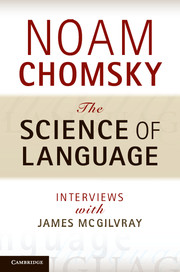Book contents
- Frontmatter
- Contents
- Introduction
- Part I The science of language and mind
- 1 Language, function, communication: language and the use of language
- 2 On a formal theory of language and its accommodation to biology; the distinctive nature of human concepts
- 3 Representation and computation
- 4 More on human concepts
- 5 Reflections on the study of language
- 6 Parameters, canalization, innateness, Universal Grammar
- 7 Development, master/control genes, etc.
- 8 Perfection and design (interview 20 January 2009)
- 9 Universal Grammar and simplicity
- 10 On the intellectual ailments of some scientists
- 11 The place of language in the mind
- 12 Chomsky's intellectual contributions
- 13 Simplicity and its role in Chomsky's work
- 14 Chomsky and Nelson Goodman
- Part II Human nature and its study
- Appendices
- Commentaries
- Glossary
- Bibliography
- Index
13 - Simplicity and its role in Chomsky's work
from Part I - The science of language and mind
Published online by Cambridge University Press: 05 June 2012
- Frontmatter
- Contents
- Introduction
- Part I The science of language and mind
- 1 Language, function, communication: language and the use of language
- 2 On a formal theory of language and its accommodation to biology; the distinctive nature of human concepts
- 3 Representation and computation
- 4 More on human concepts
- 5 Reflections on the study of language
- 6 Parameters, canalization, innateness, Universal Grammar
- 7 Development, master/control genes, etc.
- 8 Perfection and design (interview 20 January 2009)
- 9 Universal Grammar and simplicity
- 10 On the intellectual ailments of some scientists
- 11 The place of language in the mind
- 12 Chomsky's intellectual contributions
- 13 Simplicity and its role in Chomsky's work
- 14 Chomsky and Nelson Goodman
- Part II Human nature and its study
- Appendices
- Commentaries
- Glossary
- Bibliography
- Index
Summary
JM: Could we talk a bit more about the notion of simplicity and its development in your work? There's always been that notion of theoretical simplicity; it's continued throughout all of your work. It's simply taken to be characteristic of the nature of scientific investigation. Then there's also that internal simplicity which you pursued in LSLT [The Logical Structure of Linguistic Theory] and Aspects [of the Theory of Syntax] . . .[C]
NC: . . . and also in the earlier work. That second one leads directly to what's called “the Minimalist Program.” That's just another name for it. At some point – sort of like in the fifties when you begin to try to reframe the methodological studies of language into a biological perspective – sometimes you can reframe the methodological conditions into empirical hypotheses about how organic systems, or maybe all systems, are formed. And to the extent that you can do that, you can investigate them as empirical hypotheses and look for evidence elsewhere – say, in the formation of snowflakes, or insect navigation, and so on – and see if there really are principles of computational complexity or whatever that are simply a part of nature, just as other natural laws are. And if you can reduce aspects of language to those, you have an account that – in the technical terminology of linguistics, where explanatory adequacy is solving Plato's problem – goes beyond explanatory adequacy.[C] You can begin to ask why the principles of Universal Grammar have these forms and not other forms. It becomes an empirical problem of biology; and it's on a par with others – actually, the kind that Turing was interested in.
- Type
- Chapter
- Information
- The Science of LanguageInterviews with James McGilvray, pp. 80 - 85Publisher: Cambridge University PressPrint publication year: 2012

